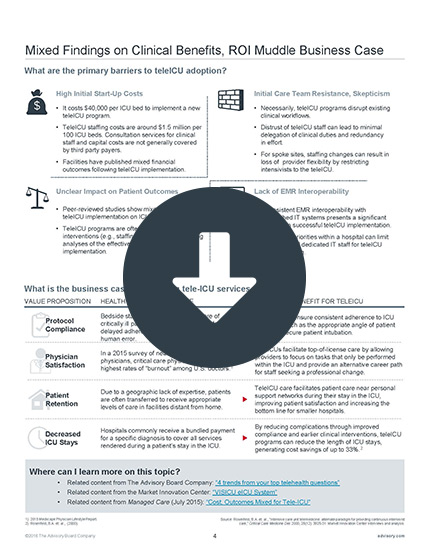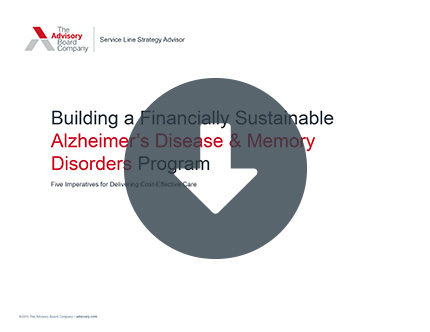Auto logout in seconds.
Continue LogoutIt's estimated up to half of intensive care patients develop serious cognitive impairment, and Vanderbilt University Medical Center recently launched a new clinic to determine why and to identify ways to treat the condition, Richard Harris reports for NPR's "Shots."
Get 5 strategies to provide cost-efficient Alzheimer’s and dementia care
How an ICU stay leads to dementia
After a routine knee surgery 10 years ago, sepsis landed Richard Langford in the ICU.
During his month-long stay, Langford experienced hallucinations, confusion, and scrambled thinking—all symptoms of delirium. "I saw green grass," he recalled, "and I saw, on the other side of the river, it looked like there was Elijah, [the prophet]."
Langford's experience isn't unique. About 30% to 50% of ICU patients experience dementia following their ICU admission, Harris reports for "Shots."
But little is known about the condition, which some doctors call ICU delirium or post-ICU syndrome. Doctors do know the cognitive damage appears similar to a traumatic brain injury or Alzheimer's disease, Harris reports. Symptoms include delirium as well as anxiety, depression, and post-traumatic stress disorder.
E. Wesley Ely, an intensive care specialist who leads the research and treatment efforts at Vanderbilt University Medical Center, said the syndrome can affect anyone, even patients without a history of cognitive conditions. "You have somebody coming into the ICU with a previously very well-working brain, and they leave critical care not being able to have a good conversation," he explains. "Our patients tell us what a misery this form of dementia is."
Ely, who has observed his patients for over a decade, said that, while one-third of patients with post-ICU syndrome fully recover, another third of patients' cognitive problems stayed the same, and the last third experienced deteriorating cognitive impairment.
What Vanderbilt has learned—and what it wants to learn next
Vanderbilt has established a clinic to study and treat people like Langford who experience the syndrome, Harris reports.
The researchers are certain that the post-ICU cognitive effects are correlated with the delirium a patient experiences in the ICU, Ely said. "Every day you're delirious you have about a 35% increased risk of this dementia," he explains. "So if you do the math on that—[after] three days of delirium, you have almost a sure thing you're going to have some elements of the dementia."
But, since researchers have yet to figure out how the symptoms come about, Ely is initiating a new study to figure out what parts of the brain are impacted by the syndrome and how the effects of extended delirium differ from other types of dementia, Harris reports. To study this, Vanderbilt plans to build a network of clinics to treat and follow up with patients that were discharged from ICUs.
Hope for a post ICU-delirium treatment
While researchers still have much to learn about post-ICU delirium, there is hope for patients affected by the condition, said Joanna Stollings, a clinical pharmacist and member of the interdisciplinary team that staffs the Vanderbilt clinic.
Some of the effects, like depression and anxiety, are treatable with talk therapy and "if it's appropriate, we can put them on medications, which can help with this as well," Stollings explains.
Doctors also can borrow rehabilitation processes for conditions that have similar symptoms, such a stroke or brain injury, according James Jackson, neuropsychologist at the Vanderbilt ICU Delirium and Cognitive Impairment Study Group.
"Even though these patients haven't been hit on the head with a hammer [and] they haven't fallen off a ladder, in many respects what people suffer is indeed a brain injury," he said.
Jackson, along with other researchers at the Vanderbilt clinic, are testing treatment options, including brain training exercises, and their effects on patients. However, he said that while "[i]t would be nice if [these exercises] improved test scores," Jackson said the "bigger" questions are whether treatments help patients live normal lives. "[D]oes it make them more adept at returning to work? Or are they able to balance their checkbook? Are they driving without accidents?"
For Langford, the treatment at Vanderbilt's clinic helped him recuperate some of these abilities. "I was able to get in the car, go to our little precinct, which is maybe half a mile, and was able to come back," he says. "The forest got a little bit smaller" (Harris, "Shots," NPR, 10/10).
Five strategies to build a financially successful memory disorders program
Over 5.3 million Americans currently suffer from Alzheimer's disease and related memory disorders and the number is rising. On top of increased demand, reimbursement processes fail to meet the complex needs of these patients who require multifaceted care.
Here are the five key strategies that a program of any scope and size can implement to provide cost-efficient Alzheimer's and dementia care.
Don't miss out on the latest Advisory Board insights
Create your free account to access 1 resource, including the latest research and webinars.
Want access without creating an account?
You have 1 free members-only resource remaining this month.
1 free members-only resources remaining
1 free members-only resources remaining
You've reached your limit of free insights
Become a member to access all of Advisory Board's resources, events, and experts
Never miss out on the latest innovative health care content tailored to you.
Benefits include:
You've reached your limit of free insights
Become a member to access all of Advisory Board's resources, events, and experts
Never miss out on the latest innovative health care content tailored to you.
Benefits include:
This content is available through your Curated Research partnership with Advisory Board. Click on ‘view this resource’ to read the full piece
Email ask@advisory.com to learn more
Click on ‘Become a Member’ to learn about the benefits of a Full-Access partnership with Advisory Board
Never miss out on the latest innovative health care content tailored to you.
Benefits Include:
This is for members only. Learn more.
Click on ‘Become a Member’ to learn about the benefits of a Full-Access partnership with Advisory Board
Never miss out on the latest innovative health care content tailored to you.


